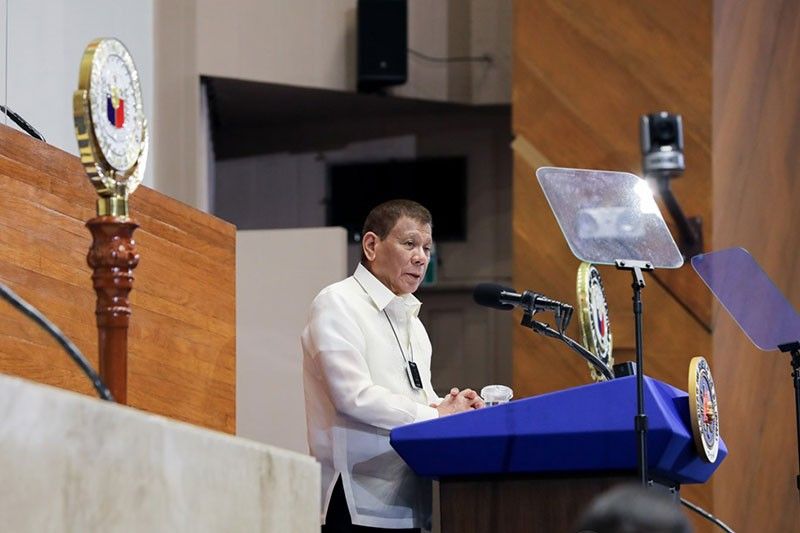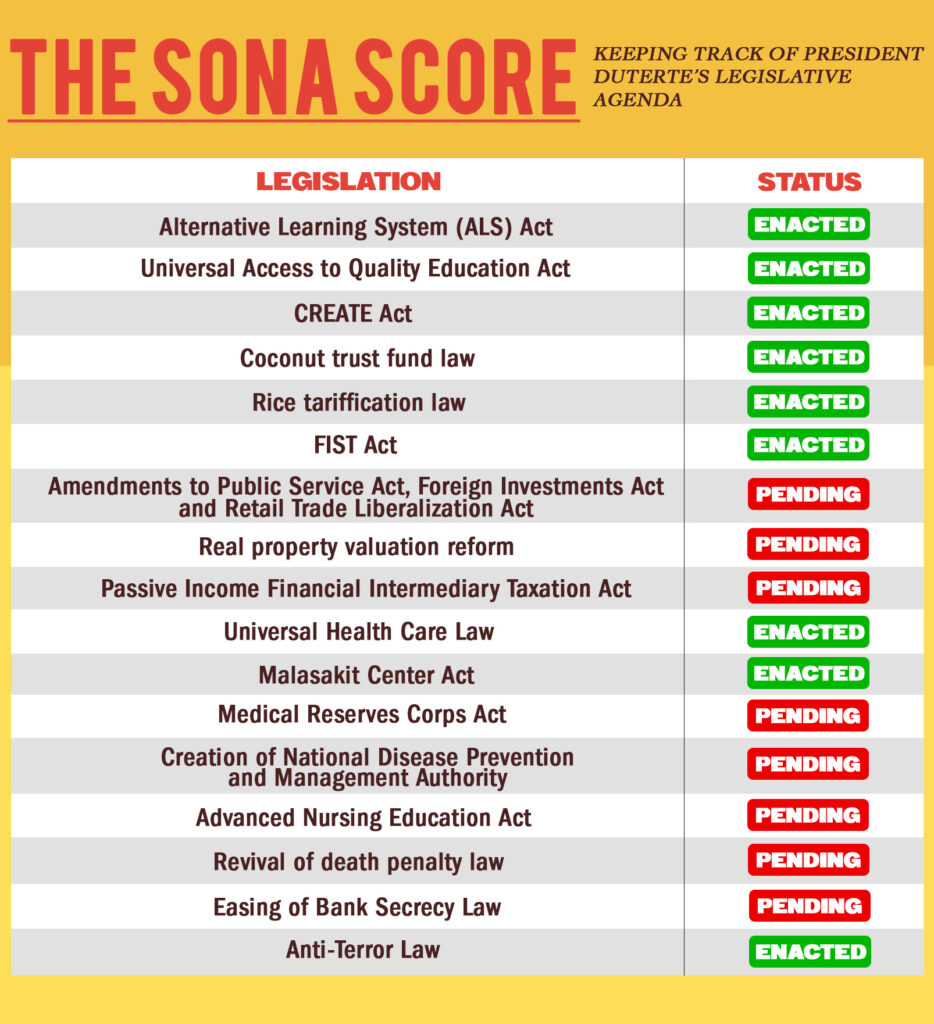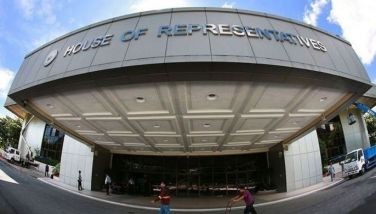The SONA score: Keeping track of Duterte’s legislative agenda

MANILA, Philippines (Talamitam.org) — From landmark Comprehensive Tax Reform Program to the controversial passage of the Anti-Terror Law, Talamitam looks back on President Rodrigo Duterte’s legislative promises ahead of his final State of the Nation Address (SONA).
Duterte has so far signed 19 of his legislative priorities, but 41 measures remain pending in both the Senate and the House of Representatives. This is despite the fact that the president’s allies constitute a supermajority in Congress, which could fast track the passage of his priority bills.
Political experts suggest that the COVID-19 pandemic may have reshuffled Duterte’s legislative agenda, prioritizing more essential bills like the Bayanihan laws over others. Internal rifts such as the one going on within Partido Demokratiko Pilipino-Lakas ng Bayan (PDP-Laban) only underscore the fragility of Duterte’s political coalition.
With less than a year in office, what will be the president’s agenda for his final SONA?
Froilan Calilung, a political science professor at the University of Santo Tomas (UST), said that this final state address would be a “reevaluation and recapitulation” of the Duterte administration’s work in the past years.
This includes the war on drugs, attempts to dislodge the oligarchs and make huge tax evaders pay their taxes as well as the current diplomatic dealings with China, he told Talamitam in an interview.
Legislative and policy consultant Michael Yusingco said he had “little expectations” for the final SONA, but feared that Duterte would use it to announce his vice-presidential bid.
“I expect his listing of achievements and also, really, gripes about his opponents, his critics, but beyond that I have little expectations,” he told Talamitam in an online interview.
“[P]ero sa totoo lang, ang kinakatakutan ko (But the truth is, I fear) that he will finally declare that he will run again as VP because that will certainly distract him in his last year, instead of focusing on really getting the job done because he has a lot of backlogs and unfulfilled promises,” he added.
Meanwhile, Malacañang remains optimistic that Congress will pass Duterte’s remaining priority bills before his term ends, and even with the upcoming national polls.
“Well, kampante naman po kami dahil napakabuti po ng samahan ng presidente sa parehong kapulungan ng Kongreso na kung talagang urgent ang nature ng bill eh maipapasa naman po iyan (We are confident in the passage of these urgent bills because of the good relationship between the president and both houses in Congress),” presidential spokesman Harry Roque said during a Palace briefing.
“[K]inakailangan ipasa na [priority bills] sa lalong mabilis na panahon (they need to be passed immediately) kasi kapag pinaabot pa natin sa susunod na taon, alam natin busy na sa pulitika ang lahat (Otherwise, everyone will be busy with politics come next year). So the priority bills must be heard and hopefully passed within the year 2021,” he added.
Talamitam assessed Duterte’s legislative scorecard and found that some priority measures have yet to be fulfilled while some, after being signed into law, need a review of their implementation.
Economy
Tax reforms, easing economic restrictions — Pending
In his first SONA, Duterte promised tax reforms geared toward a simpler, “more equitable” tax system to bring in investments and create jobs. The Comprehensive Tax Reform Program (CTRP) was the Duterte administration’s response.
Four out of the eight CTRP packages have been signed into law, including the Corporate Recovery and Tax Incentives for Enterprises (Create) Act enacted last March.
The Create Act boasts of the largest stimulus package in the country’s history, cutting down the corporate income tax rate by five percentage points and granting different fiscal incentives to enterprises, among others.
Tax reform packages passed earlier included the law increasing excise taxes on tobacco and alcohol products, the Tax Amnesty Act, and the Tax Reform for Acceleration and Inclusion (Train) Law.
Meanwhile, the remaining four packages are pending in Congress, including the proposed real property reform and Passive Income Financial Intermediary Taxation Act.
With the 2022 national elections right around the corner, Calilung said Congress would have little time acting on the remaining CTRP measures.
“We are actually in the homestretch. Once we start the filing of the candidacy come October, everything else will be on the election,” he said.
Lawmakers seeking reelection are likely to support the president’s remaining priority economic measures to gain favor from the public, Marlon Villarin, a political science instructor in UST, said.
In his first SONA in 2016, Duterte vowed to ease economic restrictions in the country. He certified as urgent in April amendments to the Public Service Act, the Foreign Investments Act, and the Retail Trade Liberalization Act.
The president signed into law last February the Financial Institutions Strategic Transfer Act, which will address financial institutions’ bad loans arising from the pandemic.
Coconut trust fund, rice tariffication laws — Enacted
In the agri-economic sector, the Coconut Farmers’ and Industry Trust Fund Act was finally passed in February—nearly five years after Duterte promised to sign such a law in his first 100 days in office.
Under this law, the government will establish a trust fund for the tax levies stolen from the coconut industry and its farmers during the Marcos era.
The Rice Tariffication Law, which liberalizes rice imports to ensure adequate supply of the staple, was passed in February 2019.

Education
Alternative learning system law — Enacted
Though Duterte has been pithy when it comes to his plans for the education sector during his previous SONAs, he was able to sign into law a measure institutionalizing the country’s Alternative Learning Systems (ALS), which will allow out-of-school youth and students in marginalized sectors to pursue a proper education. It will also help create more salaried teaching positions to bolster the ALS Teachers Program. The ALS Act was signed into law in January.
Universal access to tertiary education — Enacted
The Universal Access to Quality Tertiary Education Act, signed into law in August 2017, ensured full government subsidy for the tuition and miscellaneous fees of students enrolled in state and local universities and colleges in the country. The Commission on Higher Education in May said that nearly 1.6 million students were benefiting from the program despite the prohibition of face-to-face classes due to the COVID-19 pandemic.
The education sector is one of the most severely affected by the pandemic and its long lockdowns, with schools closing down and students grappling with the new distance learning setup.
Calilung said many universities did not possess the infrastructure yet to acquire new technologies and facilities.
Yusingco said that the situation revealed the flaws of the country’s education system and called for reforms in existing laws.
“I think we need to review the current set of laws that form the framework of our public education system. What we do need is really more attention on improving our education system,” he said.
Health
Universal health care — Enacted
One of the chief executive’s earliest promises was the passage of a Universal Health Care (UHC) Law, which aims to provide the poor access to medical services.
“The government will also provide universal health insurance for all Filipinos benefits… Sali na lang natin sa PhilHealth,” Duterte said in his first SONA five years ago. Three years later, in February 2019, the bill was signed into law.
One of the UHC’s salient features is the establishment of the National Health Insurance Program which will automatically enroll Filipinos into the program’s array of health services, from preventive care to rehabilitative care.
But despite the well-intended premise of the law, its implementation has been dogged by a combination of internal problems and legal issues, all of which have been exacerbated by the COVID-19 pandemic.
The problems, which were highlighted by the corruption controversies that hounded PhilHealth, hindered Filipinos from benefiting from this landmark law.
“I think [the UHC Law] may actually be relegated to the background for a considerable degree of time until we merge out of the pandemic kasi nagkaroon ng problema with the [Implementing Rules and Regulations] and there is also the problem with the agencies themselves, like the DOH and the PhilHealth,” Calilung said.
Yusingco said that aside from potential improvements in the UHC Law, there was also a lack of resolve from the Department of Health, a major stakeholder, to further implement it properly.
Expansion of Malasakit Centers — Enacted
Malasakit Centers were originally a pet project by long-time Duterte aide Sen. Bong Go to provide Filipinos, especially the indigent population, a so-called “one-stop shop” to avail themselves of medical or financial assistance offered by the national government.
In his 2019 SONA, Duterte cited the expansion of Malasakit Centers as one of the projects he wanted to prioritize and later that year, he signed the Malasakit Center Act.
However, Yusingco pointed out that communities needed more wide-reaching health institutions instead of these “upgraded barangay health centers.”
“Yung Malasakit Centers, they’re just really an upgrade to barangay health centers eh. What we need are health institutions, or hospitals that can really serve the entire population or the entire community, hindi yung mga intermediate services,” he said.
Medical Reserves Corps Act — Pending
The creation of a Medical Reserve Corps (MRC) Act was one of Duterte’s priority bills in his penultimate SONA last year. It is pending at the Senate.
Once passed, an MRC group under the DOH will be formed and will consist of medical student graduates and health professionals who will be called on times of crises to aid the national and local government.
Another provision in the proposed bill is the involvement of the Armed Forces of the Philippines, who will provide expertise to the group for an “efficient, swift and effective” deployment.
Calilung said the health sector was better left to experts in the field and that military involvement was unnecessary.
Creation of National Disease Prevention and Management Authority — Pending
Another legislative priority along with the MRC Act is the creation of a National Disease Prevention and Management Authority to prepare the country for any future health crises.
The proposal for such an agency is not new. Back in 2013, the late Sen. Miriam Defensor-Santiago filed Senate Bill 1573, or the “Pandemic and All-Hazards Preparedness” bill, which had a similar premise.
Calilung noted that funding for infrastructure and facilities would be this bill’s greatest obstacle.
Printed copies of the measure were sent to members of Congress last July 14 as of this writing.
Advanced Nursing Education Act — Pending
Under this law, higher education institutions will be required to have both basic and post-graduate education in the nursing programs. Both the Senate and House versions of the proposed law are currently being deliberated at the committee level.
The Advanced Nursing Education Act seeks to amend the Philippine Nursing Act of 2002, which only originally sought to provide a clear-cut and comprehensive definition of the nursing profession in the country.
Crime and national security
Revival of death penalty law — Pending
Since his campaign, Duterte has been vocal about his interest in reviving the capital punishment for crimes related to drugs and corruption. He reiterated his call for its “swift passage” during his 2020 SONA.
However, the proposition was met by contradicting opinions. The Catholic Bishop’s Conference of the Philippines (CBCP) and other religious organizations strongly opposed the re-imposition of the death penalty. The Commission on Human Rights (CHR) has also raised its concern in the issue, saying that it could weaken the state’s “moral ground to plead for the lives of our OFWs (overseas Filipino workers) on death row.”
Senators like Manny Pacquiao and Ronald “Bato” Dela Rosa have been vocal on their support for the reinstatement of the death penalty. Pacquiao, despite of religious background, believes that death penalty would discourage individuals from committing heinous crimes.
Villarin said the reinstatement of death penalty was “not an easy legislation” despite Duterte having the support of a big majority in Congress.
“Filipinos remain conservative about death penalty,” he said.
Calilung said Duterte’s remaining year as chief executive would not be sufficient for the administration to pass such a law.
“We cannot railroad it especially in a very short span of time, especially all eyes and ears are geared toward the next election not to mention that we have the pandemic to contend with,” he said.
Back in 2017, a bill reinstating the death penalty withstood the scrutiny of the lower chamber of the legislative, but was turned down in the Senate.
Easing of Bank Secrecy Law — Pending
Duterte has yet to relax the country’s Bank Secrecy Law, which is considered being among the strictest in the world and a safeguard for corrupt officials as it restricts public access to their bank accounts. Amendments are still at the committee level.
Yusingco said amending the provision would prove difficult as it would directly affect lawmakers and their self-interest.
Moreover, he also cited an overall “lack of political will” from Duterte who had refused to publicize his Statement of Assets and Liabilities and Net Worth.
“The anti-corruption measures that we need are not successfully being pushed because lukewarm lang yung pag-promote nu’ng mga measure na ganun [the promotion of these measures],” Yusingco stressed.
Earlier this year, Transparency International, an independent organization that monitors corruption across the world, placed the Philippines at the 118th spot out of 180 nations in the Corruption Perception Index. According to the study, corruption in the Philippines worsened, as the country was ranked at 99th the previous year, due to the “stagnant” efforts to end corruption.
Anti-Terror Law — Enacted
More than a year ago now, Duterte signed into law the controversial Anti-Terrorism Act, which immediately received backlash from rights groups. More than 30 petitions against it have been filed before the Supreme Court.
The law would allow designated authorities to detain suspected terrorists for up to 24 days even without a warrant. The law was interpreted negatively by some lawmakers, human-rights activists and legal experts, citing that this could be used as a state weapon to suppress opposing ideas.
Yusingco said an anti-terrorism measure would only work if the community supported it — the opposite of what happened in the Anti-Terror Law.
“They should have gotten the public’s support first instead of fast-tracking it,” he said.
Villarin believes that the provisions of the law were “generally good.” But the Constitution needs to align the country’s national security with the international standards of combating terrorism, he said.
What’s next?
A focus on the remaining priority measures is what Duterte ultimately needs to convey in his final SONA, political analysts said.
“[T]he SONA should actually have a special and exalted place wherein the president should only focus on the priority measures, as well as in the case of this last SONA—how he will cement his legacy for the past six years,” Calilung said.
“Political bickerings and small talk on politics, particularly with his political opponents should not have a place anymore in his last SONA,” he added.
Villarin said Duterte should also address all the allegations hurled against the administration to end his term “honorably.”
“Kailangan masagot yung mga tanong bumabalot sa kanyang administrasyon ([President Duterte] should answer the questions against his administration), particularly the accountability in the war on drugs,” Villarin said, citing for example the funds used in the drug-busting operations.
He said allegations of corruption and the West Philippine Sea dispute should also be addressed in his final speech.
As for Yusingco, Duterte should give final directives on what the country would do to move forward from COVID-19.
“For [Duterte’s] last year, we need him to focus on enacting the laws in his priority list. And the second thing is actually we need a president who will lay the foundation for the country moving forward from this pandemic,” he said.
“Kailangan naka-focus ‘yung pangulo natin du’n sa aspeto na development natin (The president needs to focus on the aspect of our development). We need to move forward from this pandemic, and a president who is engaged in politics will not be able to do that.”
___
NOTE: This article is an output of Talamitam, a network of schools established on 2017 by journalism societies of the University of Santo Tomas, Bulacan State University, Colegio de San Juan de Letran, Lyceum of the Philippines University, Polytechnic University of the Philippines and University of the East. Talamitam aims to empower ordinary citizens through community journalism, focusing on topics not commonly reported by mainstream media companies and alternative angles of current issues.
To achieve its goal of raising public awareness about community issues, Talamitam contributes articles to media outlets. News organizations can use or republish the stories for free provided they give credit to Talamitam and the authors.
Talamitam is a Tagalog-Kapampangan word for conversation.
This article first appeared here.
- Latest
- Trending































